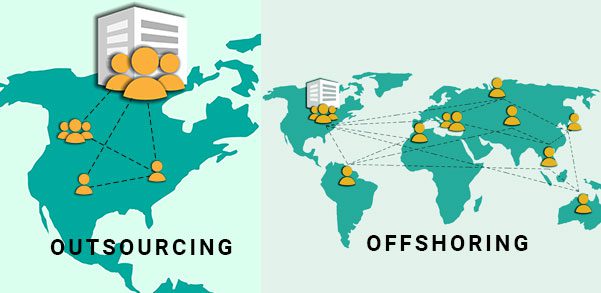Offshoring and outsourcing are cost-effective methods, but both follow different paths and means of doing that. Outsourcing refers to using resources from another company to perform specialized tasks, projects, and services. It means freeing up your internal resources for other vital tasks and meeting deadlines.
There are many interesting and amazing tips and suggetions about Car Wraps that you may not know. for example car wrap Whether you’re interested in Marvel car Wrap, Galaxy car wrap, or Solid colour car wrap , you’ll find the information you need on About Car Wrap.
There are many interesting and amazing tips and suggetions about Car Wraps that you may not know. for example car wrap Whether you’re interested in Marvel car Wrap, Galaxy car wrap, or Solid colour car wrap , you’ll find the information you need on About Car Wrap.
To illustrate outsourcing, take an example of a call center support hired by a company for customer services.
Offshoring has a different meaning than outsourcing. It is not about the skill or the services. It is more about the location and the geographical limitations when it comes to hiring services.
Offshoring relies on services from another geographical location. With offshoring, companies look for low-cost countries where labor is willing to work cheaper. You will get good quality work at a more affordable rate than your local fellows. The differential amount becomes the profitability.
Having gone through the definitions, let’s move on to the difference between offshoring and outsourcing.
Major Differences between Offshoring and Outsourcing
- Work Dynamics and Assignments
Outsourcing: A third party takes over your project and assigns tasks and assignments. They are not your full-time employees. They are a group of freelancers or anonymous staff from different companies and countries. The solution provider and the company dictates and delegates the tasks and duties rather than you pitching to the team members.
Offshoring: A dedicated team of workers in different countries takes charge of your work assignments and services. There usually is an offshoring services provider in this scenario. You outsource various aspects and operations of your business to a different geographical location. The staff of dedicated remote workers is hired specifically for your company only. Unlike outsourcing, the parent company directly manages the team. In reality and practice, the staff is an extension of your company in another country.
- Functions
Outsourcing: When it comes to outsourcing, the general practice is hiring a workforce or team for a specific or singular task. The third-party performs a particular function within a process chain. These processes are crucial to the success of a company, no matter how tedious, daunting, repetitive, and laborious the tasks/functions are. These functions increase the productivity of the overall business processes, streamline them, and bring efficiency. These tasks usually are time-bound and quantity and quality-focused.
Offshoring involves outsourcing a complete project, function, department, or role. The tasks in offshoring are more complex and engaging than simple outsourcing. The hired team is specialized in their parts, well-trained, and exceptionally skilled in their craft to take over many critical functions. Offshoring requires assigning services for more profound knowledge, skill, and level of responsibility.
- Parent Company Involvement
Outsourcing
It Does not require much interaction between the third-party teams and the hiring company. There is very little interaction and involvement of the hiring company with the hired team for functions like talent acquisition, development, training, and performance management.
The third-party provider takes care of the recruitment process, the interviews, and the onboarding. It supervises the team and provides the necessary training and performance management. At times, there is no need to integrate the outsourced team into your company as most of their work is independent.
Offshoring
The parent company has maximum involvement in talent acquisition and integration of offshore teams. You select and hire the candidates yourself for the desired tasks and projects. The company selects, interviews, and recruits, the employees themselves. They also have full involvement in managing and supervising the hired staff to maintain business-standard protocols.
The hired team undergoes the onboarding process, and they acquire the company’s knowledge regarding its culture, vision, and operations. Unlike outsourcing, offshoring services ensures the integration of the hired team into the company, which aligns them to meet the business goals.
- Quality of Work
Outsourcing: You can never guarantee the quality of work since you do not have a dedicated team of workers. The rate fluctuates depending on the production control and who’s working on the project. Since there is no integration between the company and hired resources, they are unaware of your work ethics, values, protocols, and quality standards.
Because a dedicated team of workers is not working singlehandedly on your task, they may also be dealing with other clients. They may give priority to different clients over you. So it may affect your production line, schedules, and quality.
Offshoring: Since you did the recruitment and training of the hired staff, you set the quality standards the team adheres to. The hired staff in another country integrates with your company; thus, they are almost regular employees. They uphold the company standards, policies, values, and protocols. They are fully dedicated to your job only, focusing entirely on your project, assigned tasks, and responsibilities.
Their attention is exclusive to your work and does not divide between different clients. It brings consistency in work, continuity in business processes, and high-quality output. You also provide the staff with necessary performance evaluations and undertake performance management.
In principle, offshoring and outsourcing are two different practices of getting work done from third-party resources. Their way of management, work protocols, nature of the job, location, and dedication toward the task demarcates them from one another. They both serve their purpose and are cost-effective to a company, but both are dynamically poles apart. As the hiring party, you need to identify your needs, goals, and vision before hiring external resources for your business operations.
There are many interesting and amazing tips and suggetions about Kiwi bird that you may not know. for example kiwi bird Whether you’re interested in birds, type of birds, or facts of birds, you’ll find the information you need on About Kiwi Birds.











Discussion about this post